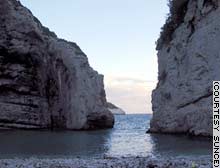
Stiniva passage on the island of Vis |
KOMIZA, Croatia (Reuters) -- During 50 years of communist rule in former Yugoslavia, the Croatian island of Vis remained an inaccessible naval base lost in the middle of the Adriatic.
The islanders eked a living from fishing and services for the Yugoslav military. Tourism, which in today's Croatia generates some $4.0 billion in revenues a year, came much later to the island than it did elsewhere on the Adriatic coast.
There are no big socialist-style hotels here, some 12 years after Croatia left Socialist Yugoslavia and fought an independence war with its ethnic Serb minority and the Yugoslav army.
The place looks more like an early 20th century fishermen's settlement and, with some luck, it may stay that way.
The World Wildlife Fund (WWF) has designated Vis as one of the 10 last paradises on the Mediterranean and is taking steps to preserve its pristine beauty and wildlife, while giving locals a chance to make some money in the process.
The WWF estimates that by 2020, some 350 million holiday makers a year -- or 22 percent of all tourists worldwide -- will be flocking to the Mediterranean basin, compared to the current 220 million.
It also believes that Croatia is likely to become one of the leading tourist destinations in the region, together with Turkey and Greece, and that the growth in tourism, if unchecked, may irreversibly destroy its nature.
WWF marine biologist Paolo Guglielmi said that some parts of the Mediterranean, such as most of the Middle East, Spanish or Italian coastal areas, "are already lost forever."
"But we have identified 10 last paradises that are still remarkable for their bio-diversity and are worth huge efforts to save," he told Reuters.
No mass tourism here
Among them are Vis and two other southern Croatian islands -- Lastovo and Mljet -- where tourism, although on a steady rise, has so far had a low impact on the environment.
Loggerhead turtles, bottlenose and common dolphins can still be spotted in the waters around the outer Croatian islands, which are also home to increasingly rare birds of prey.
With only four small hotels, Vis was spared the mass tourism of big lackluster dormitories, which were built everywhere by Yugoslav communist authorities before Croatia's independence in 1991.
The WWF, which has been fighting to preserve worldwide natural heritage since 1961, is now trying to convince Vis residents that tourism, profit and the preservation of nature are not mutually exclusive.
"The only way to do it is to work hand-in-hand with the locals and develop activities that are viable in the long term," said Marina Radic from the local non-governmental group Sunce (Sun), which cooperates with the WWF on the project.
"There are people who see their interest in making a living from nature-friendly activities, not in making money from large restaurants and hotels," she said.
However, she added the key was to convince the majority of the island's 3,600 people -- many of them hurrying to cash in on the growing tourist industry -- that nature must not be neglected.
Nature or profit?
Ljiljana, 58, and her daughter Lea, from Podspilje village in the heart of the island, are convinced the new concept can work. Their hobby-turned-job is making natural health products from local aromatic herbs.
They also plan to open a small boarding house to cater for "up to 10 people a week who want to see our nature and traditional way of life."
Such ideas are taking root among a handful of young adults who have set up alternative tourist agencies and ecology groups, but most islanders are still unconvinced.
"Small bed-and-breakfasts alone cannot become a driving force for our infrastructure development. We also need a bigger tourist investment," said Vicko Mardesic, the mayor of Komiza, the island's second largest town.
Aware of the dilemma, the WWF's Guglielmi readily offered the example of Cirali, a coastal community in Turkey's western Anatolia, and said he hoped it would not remain a unique case.
Cirali beach was one of the major nesting sites for the endangered loggerhead turtle. But the sites came under threat in late 1980s by increased construction of tourist facilities, as the younger generation saw tourism as an easy source of income.
"We worked closely with around 600 inhabitants of the village, who eventually removed the facilities that were taking care only of income and not of natural wealth and beauty," he said, adding the project took almost 10 years to succeed.
"We also want people on the Croatian coast and islands to develop a similar sense of ownership
http://www.cnn.com/2003/TECH/science/07/14/mediterranean.paradise.reut/